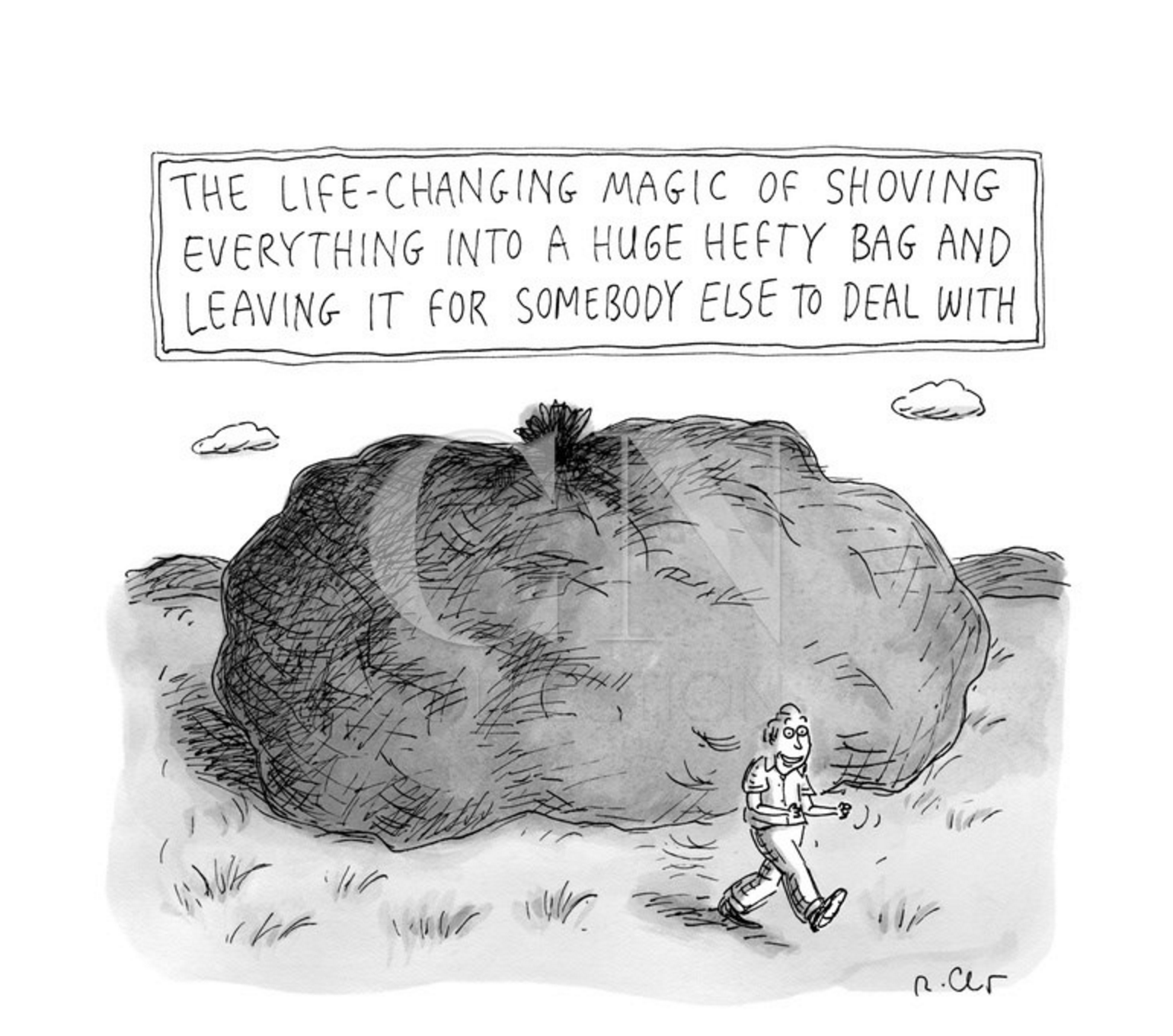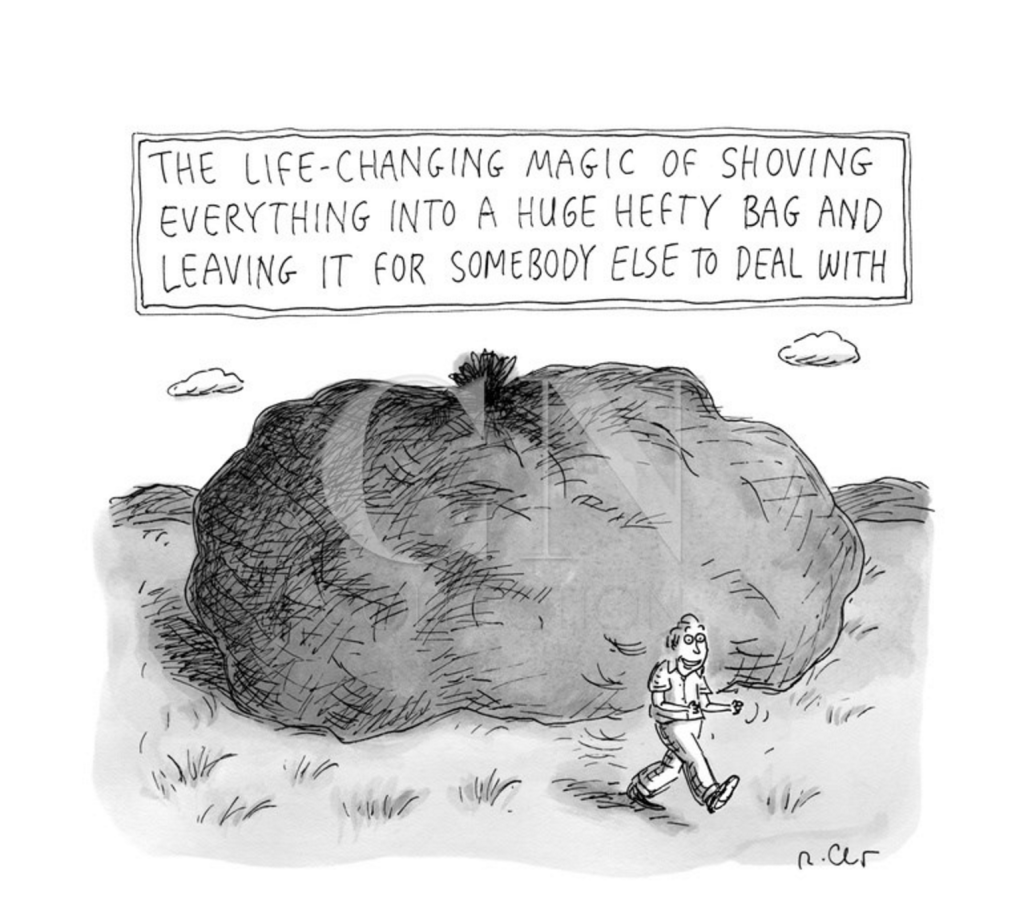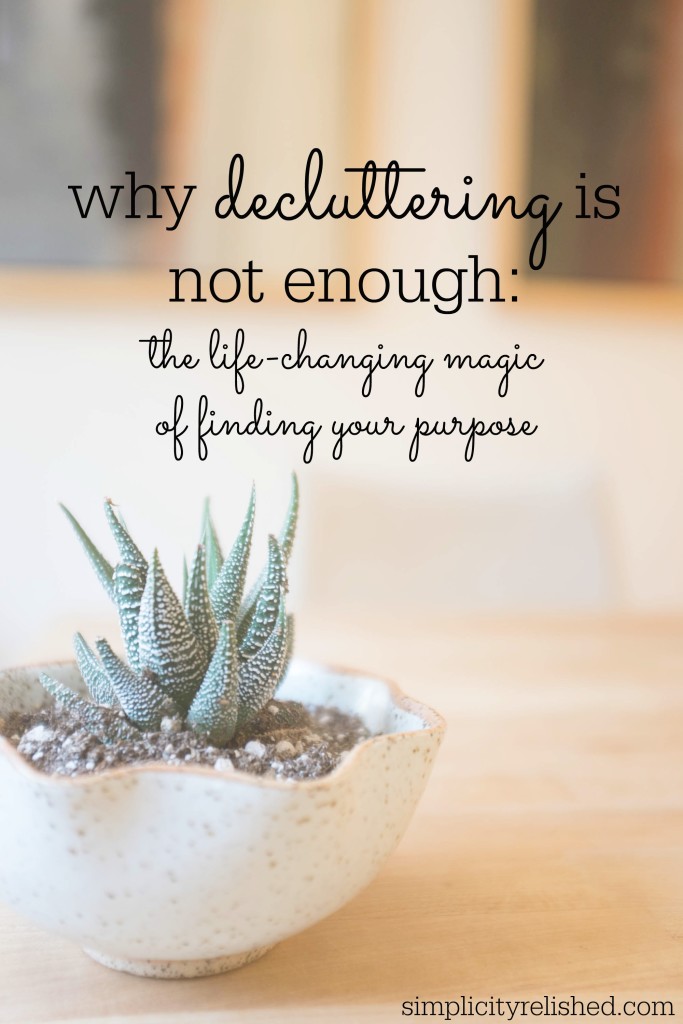I’ve been championing simplicity on this blog for about a year now. It started last fall when I came across Courtney Carver’s Project 333— a capsule wardrobe challenge that has now become a near-mainstream trend– and I took it upon myself to find additional ways to simplify my life.
I’ll be honest. I did it in part because I was intrigued by the subject, and there was already a vibrant tribe of writers I could jump right into. It also helped me focus my blog on a specific topic while in the midst of moving across the country, getting married, and becoming (more) in charge of my resources.
Simple living has become a trend in this past year– the more I wrote about it, the more I realized that others were doing the same. And now that Marie Kondo’s book, The Life-Changing Magic of Tidying Up, is a national bestseller, it seems everyone is on the simple living boat.
(via Conde Nast // purchase this print here)
As the artist above has implicated (as well as this op-ed in the New York Times), so much of the focus of simple living movement has been about de-cluttering. Get rid of this, stop buying that– buy this so that you can stop buying that– throw this away so you can get that.
But the truth is, that’s the easy part when it comes to simple living. The hard part is explaining why.
[Tweet “Decluttering is easy. Defining your purpose is hard. #minimalism via @daisylinshih”]
Here’s the problem: so often the proponents of minimalism, essentialism, simple living, intention setting– whatever term we might prefer– are so wrapped up in the losing that they don’t focus on the gains.
What are the gains, anyway, and why don’t we talk about that more?
It’s probably because so many of us don’t even know. We love the idea of intention, of simplifying, of less-is-more mentality. But although it’s easy for us to define that less, many of us can’t name the more.
We don’t know what it is we want in the long-term. Do we want to be more generous? Do we want to be more accomplished? Do we want to have more time for our friends?
Committing to any those things means hard work. It’s relatively easy to go through our closets and get rid of clothes we don’t love. The challenge is actually having the courage to change the way we live, not just how we dress or shop.
What actually changes lives
When someone says that simplicity has truly changed their life, this is what I hear: I simplified my life in order to focus on things I identified as more important.
But are you familiar with the adage, “You can lead a horse to water but you can’t make it drink”? So often we lead ourselves straight to that water: we declutter, we cut back, we spend less time poring over catalogues and organizing our things. But we’re not drinking from the clear, refreshing streams of a purpose-driven life yet. We’re still sitting on the banks wondering, What is this water going to taste like?
If you’ve ever worked in an industry or ministry geared towards life transformation– true, utter transformation– then you know that it often has very little to do with material possessions. It may start there, but it doesn’t end there. It ends in that person finding her reason to live. It ends in that person being brave enough to pursue his purpose.
Related: Lessons I learned from working in addiction recovery
The proof is in the purpose
There’s nothing magical about getting rid of stuff. There’s nothing magical about capsule wardrobes, capsule kitchens, no-spend months, shopping bans, and the like.
If there’s any magic at all, it’s the moment when people come alive to their purpose. It’s when healed people become healers. It’s broken people being made whole. It’s when all the evil of the world is turned upside down, second chances are given, and despair is turned to hope.
Simple living can help us get there, but first we have to decide where exactly we want to go.
[Tweet “Decluttering isn’t magical. The true magic happens when people come alive to their purpose. via @daisylinshih”]




I kind of agree with what you are saying and kind of don’t. For some of us, it is about decluterring and getting less attached to stuff. You see, I feel like I have a purpose. I have a fulfilling career in education that allows me to travel in the summers. My husband has the same schedule. In the evenings we spend time together, sometimes going out, sometimes walking and sometimes just cuddling on the couch. We have no debt apart from the mortgage since we recently bought our dream house. We love every minute of living in this house. We do not, however, have any school or credit card debt and we make very decent money due to having advanced degrees and finding a niche in which we can fulfill ourselves. For me, struggling with clutter was one of the biggest issues. I grew up with a pack rat. I kept fighting with my Mom because I felt suffocated and trapped by the amount of stuff we had. She would never let me get rid of anything. She wasn’t a hoarder, but our small apartment was filled to the brim with stuff she didn’t even know we had. One time when she wasn’t home. I got rid of about 6 giant trash bags of 20 years old clothes. Of course she never even noticed. For me, learning about decluttering and people thriving with less was cathartic. I realized I wasn’t crazy and I had the right to feel the way I felt. In other words, I already focused on what is important for me. The next step is to make my living space reflect that because, as much as I hated living with too much stuff, I kind of made me less sure of how much I actually need.
I am much happier living simply now, instead of being surrounded by a lot of stuff. I find that it is pretty easy to simplify your life, as long as you make the effort to get rid of physical stuff, but finding a purpose part – that’s a lot harder! I’m still working on that part myself!
Yes, I so agree that minimalism or the simplicity movement could become must as materialistic as consumerism if people don’t focus on their bigger purpose. It’s great to hear this perspective from someone in the movement. I just wrote about the importance of purpose vs. decluttering this week, too. I’d love to hear what you think. http://pretendtobepoor.com/minimalism/
Such an insightful post, as always! I’ve always been intrigued by the ‘simplicity movement’, and it’s so refreshing to hear it discussed in such an honest way!
xoxo
Kat
Ohh this is good. This is the same reason why so many people struggle with budgeting — without a purpose or goal it doesn’t seem possible. This simplicity movement is rather interesting and I wonder if it resonates more with millennials as we give and travel more and aren’t immediately rushing to be homeowners.
Yes, absolutely! Some people have definitely made minimalism all about an aesthetic.. and it’s just as easy to become a slave to that as it is to become a slave to clutter itself!
Thanks for reading this! 🙂 I’m so glad that you’ve simplified in order to find your purpose– it’s a great adventure!
Thanks so much Emily! Yes, navigating that question of what’s most important can be tough, but it’s essential to living a well-intentioned life.
Thank you Mica! I love that you set goals for your shopping bans– they shouldn’t be an end in themselves.
Ah thanks friend! I’m so glad this resonated with you. And you’re so right that decluttering can become our pitfall when we don’t have a greater goal that we are pursuing.
aw thank you Nabihah! Every comment you write is so encouraging and I am so grateful for you!
Daisy, you’ve eloquently explained something that has bothered me a bit about the ‘simplicity movement’. My personal motto about minimalism is ‘Listen to your heart, do more of what you love, and let go of all the rest.’ For me minimalism is not about a number or an aestitic, but instead about focusing on what matters first and then letting go of all the fluff (which includes a lot of clutter!) Thank you for sharing x
This is so important to me. I did the big clean out now and have defined my spaces. I think it’s time for me to now focus on finding my purpose in life. My really good friend was talking to be about how constantly having goals isn’t always good because you’re not achieving happiness at any point. I want to focus on happiness in my life and my actions now.
I love this post Daisy! I am in a transitional phase in my life where I’m seeking so much more purpose and the urge to declutter in so many aspects. I think I’m coming around to an idea of what’s more important in life and starting to navigate towards that.
Very good advice! 🙂 Decluttering is good, but it’s a means to an end and we need to know what that end is.
The shopping bans I’ve been most successful with are the ones that have had a definite goal at the end of the month – if that’s saving up for a spendy splurge or just reaching a set goal in my savings account.
Away From The Blue Blog
Yessss, Daisy! This post is everything. Decluttering isn’t going to solve your problems, but it can definitely help you shift your mindset towards a more fulfilling life. Even if you’re decluttering your home or working on capsule wardrobe, the fact of the matter is that you’re still focusing on the ‘stuff’. There may be less of it, but it’s still at the forefront of your mind. And that’s why it’s so important to take a step back and focus on the bigger picture.
Every single one of your posts makes me stop and think Daisy, that’s why I love reading your blog so much! xx